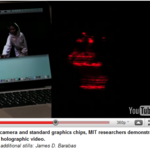Technology

[I’m re-posting this, because the original, from Saturday, seems to have disappeared.]
The big Internet tech news last week was that the last block of Internet addresses, for the version of the Internet Protocol (IP) that we mostly use (IPv4), has been allocated. Or, as the headlines said, we have now run out of Internet addresses. Of course, it’s filled the tech media, as above, but it’s shown up in the mainstream press as well; here it is from the New York Times, and from The Guardian.
What does it really mean, that we’ve run out of IPv4 addresses?
Well, for one thing, it doesn’t mean…

Facebook has always been plagued with privacy issues, such as revealing to third parties personal information which may be used to sell you goods and services. While to some, this may seem like an invasion, I like it when people try to sell me things, and I have no problem saying no. However, there is a far more insidious algorithm embedded in facebook. By a few refreshes and a few clicks, you can easily see who has most recently been looking at your facebook profile, down to a timeframe of 36 hours, as well as who your overall top stalkers are. Of course, they may not…

A Proposal for the District Community Jury Style Bank:
Executive
Summary:
A Jury Style Bank
would be a wholly innovative form of banking and community development which
can expand the formal banking system while also increasing the community’s
financial literacy and human capital.
Furthermore, economic development funds are recycled, and actual funds
injected into the community would far exceed the seed money. Establishing such an institution in
Chinatown would result in a vast inflow of capital from China if the
institution is also structured in a way to help facilitate…

The fundamental evolutionary advantage of human beings over all other species on this planet is our ability to make things. We make tools to make more complex tools to make end products that help us survive, thrive, and develop. Pre-humans may have started making simple tools over 2 1/2 millions years ago and serious complex tool-making took off during the Bronze Age just a brief 5,000 years ago.
Ever since those grand old days, humans have been exponentially improving our making abilities. Today, we're extremely good at it, and there is a growing population of amateur "Makers" who…

If wearing 3-D glasses makes you feel like we haven't progressed much since the 1950s, you are not alone. Fortunately, MIT is in the 1970s - namely, the movie "Star Wars" from 1977, using a 2011 Microsoft Xbox Kinect to create streaming holographic video of Princess Leia, among other things.
Their work is still research, achieving a few frames per second and low resolution, but it may make 3-D TV irrelevant.
At the Society of Photo-Optical Instrumentation Engineers’ (SPIE) Practical Holography conference in San Francisco last weekend, members of Michael Bove’s Object-Based Media Group…

A potentially new form of public finance and public insurance may lie in institutions of community jury banking. Jury banking is a new concept, as far as I can tell, though it is a combination of immigrant loan pools, and microfiance schemes. Immigrant loan pools because immigrants tend to get together as small communities and pool money, lending this money to a single person as startup capital for a business. THis is why south asian and east asians can afford to buy delis and taxis. The money the business makes is partially returned to the loan pool and more money is…

For robots to get 'smart', they have to learn to adapt. University of Vermont roboticist Josh Bongard has created both simulated and actual robots that, like tadpoles becoming frogs, change their body forms while learning how to walk.
Over generations, his simulated robots also 'evolved', spending less time in infant tadpole-like forms and more time in adult four-legged forms.
These evolving populations of robots were able to learn to walk more rapidly than those with fixed body forms and, in their final form, the changing robots had developed a sturdier gait, better able to…

Nanotechnology is my own field of research for 12 years now. It is one of the, if not the most important of the emerging technologies, and it is widely believed to be the vital ingredient to many by transhumanists desired transformations, be it slowing down aging, computer to brain network-neuron interfaces, or the development of ever faster (quantum) computers. Nano is still the big buzz word and I am afraid to have become the uninvited party-pooper.
I do not so much take issue with the dangers per se, say horror scenarios of self-reproducing nano-robots turning planet earth into a gray…

LONDON, January 17, 2011 /PRNewswire/ -- With a famous showdown between man and machine looming, bookmakers Bodog.com are sad to report that IBM's Computer, known as Watson, is the odds-on favorite to beat both Jeopardy champions Ken Jennings and Brad Rutter. IBM's supercomputer, Watson, will compete in an edition of the popular US quiz show Jeopardy next month for a prize of USD$1m (GBP634,000).
Ken Jennings, who once won 74 Jeopardy games in a row, is the 5/2 to win the show that will be screened over three days from February 14-16.
Brad Rutter, who scored the most money with…

Every now and again, something happens that makes you want to shake someone's hand and then take a hatchet to their throat - and there's a good chance that a number of these occurrences will be in computer science. Recently, I ran into one of these situations and I'd like to take a few moments to write about it here, since I think it will be of at least cursory interest to some of the readers here.
About a month ago, Science and Supermodels was hacked. Considering that I occasionally work on that site and it's a nice funny place to read about awesome science, I had to figure out what the hell…